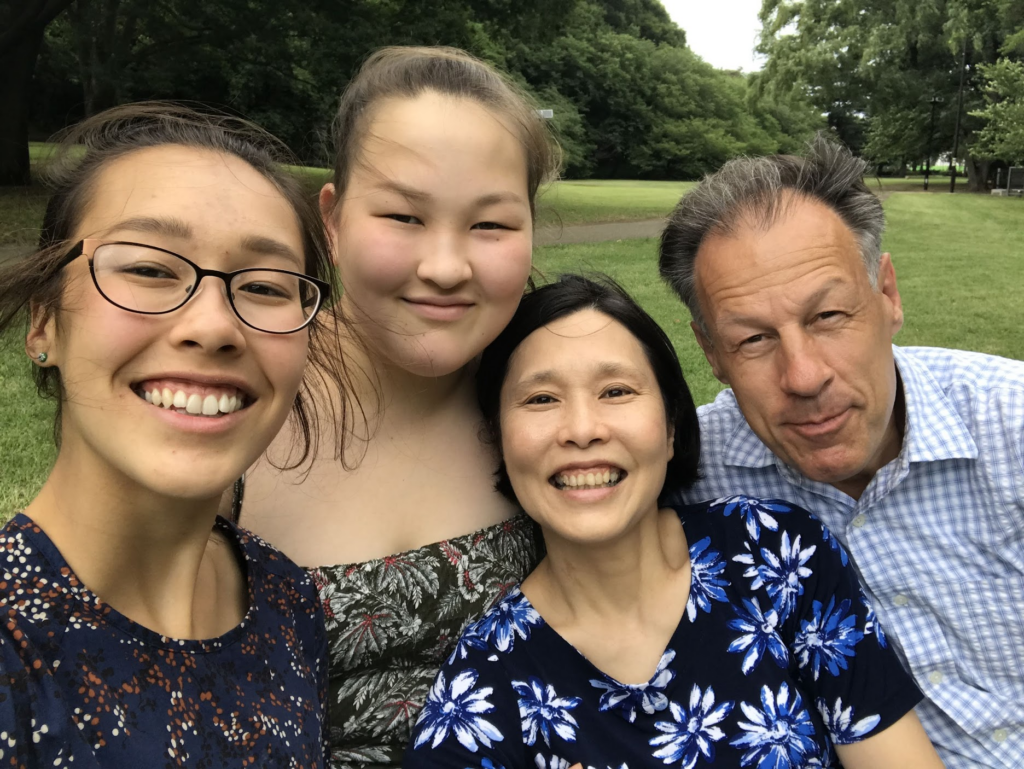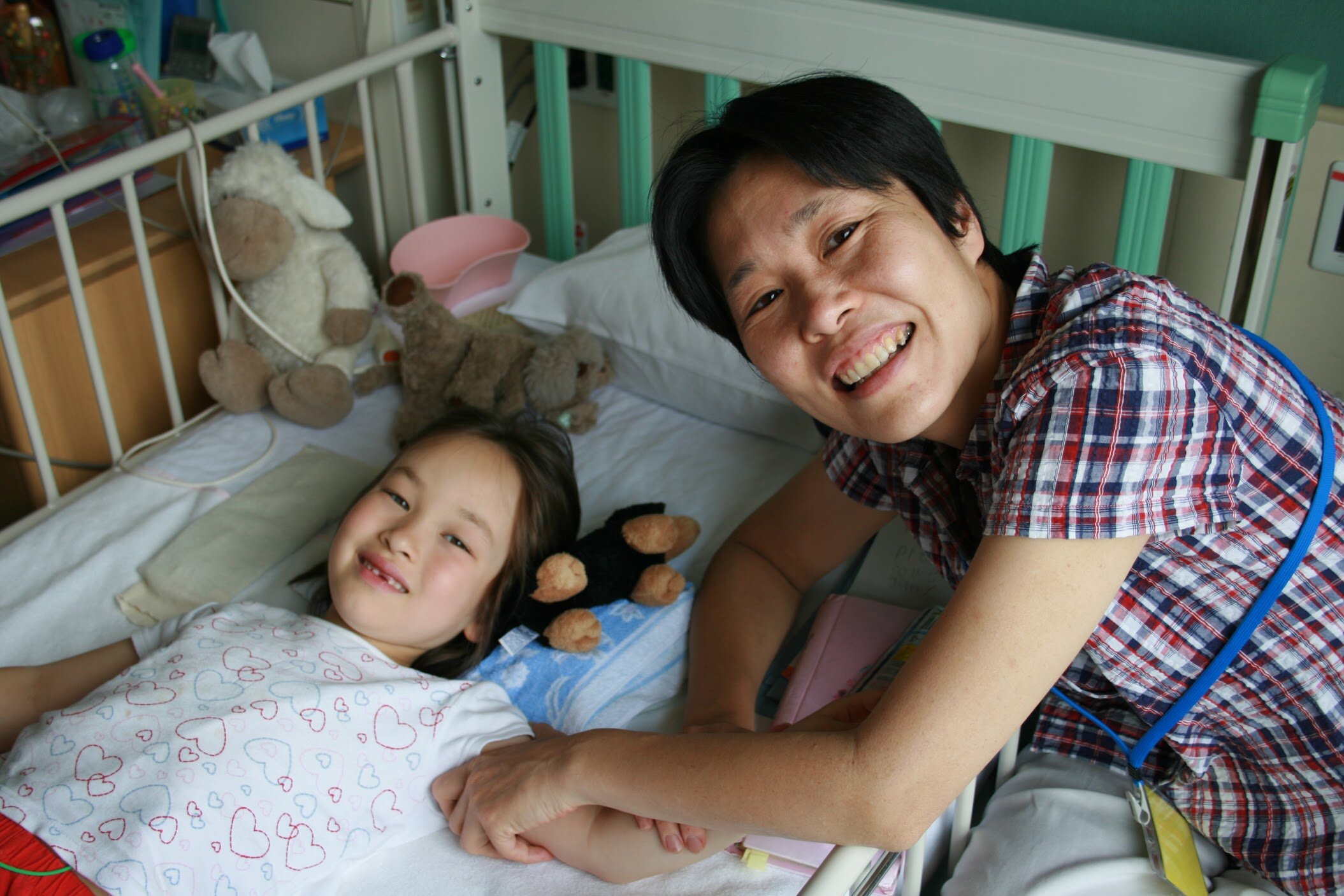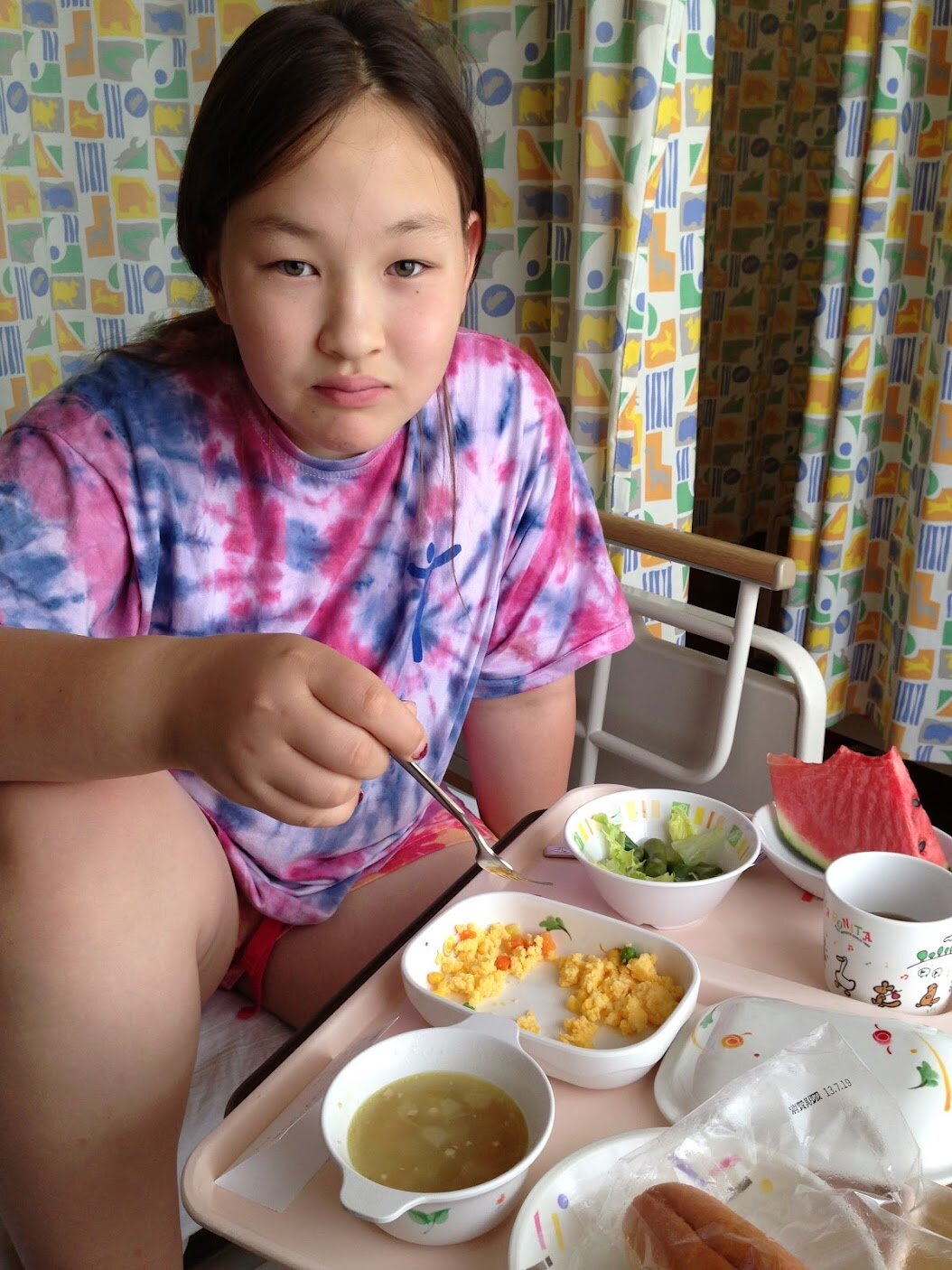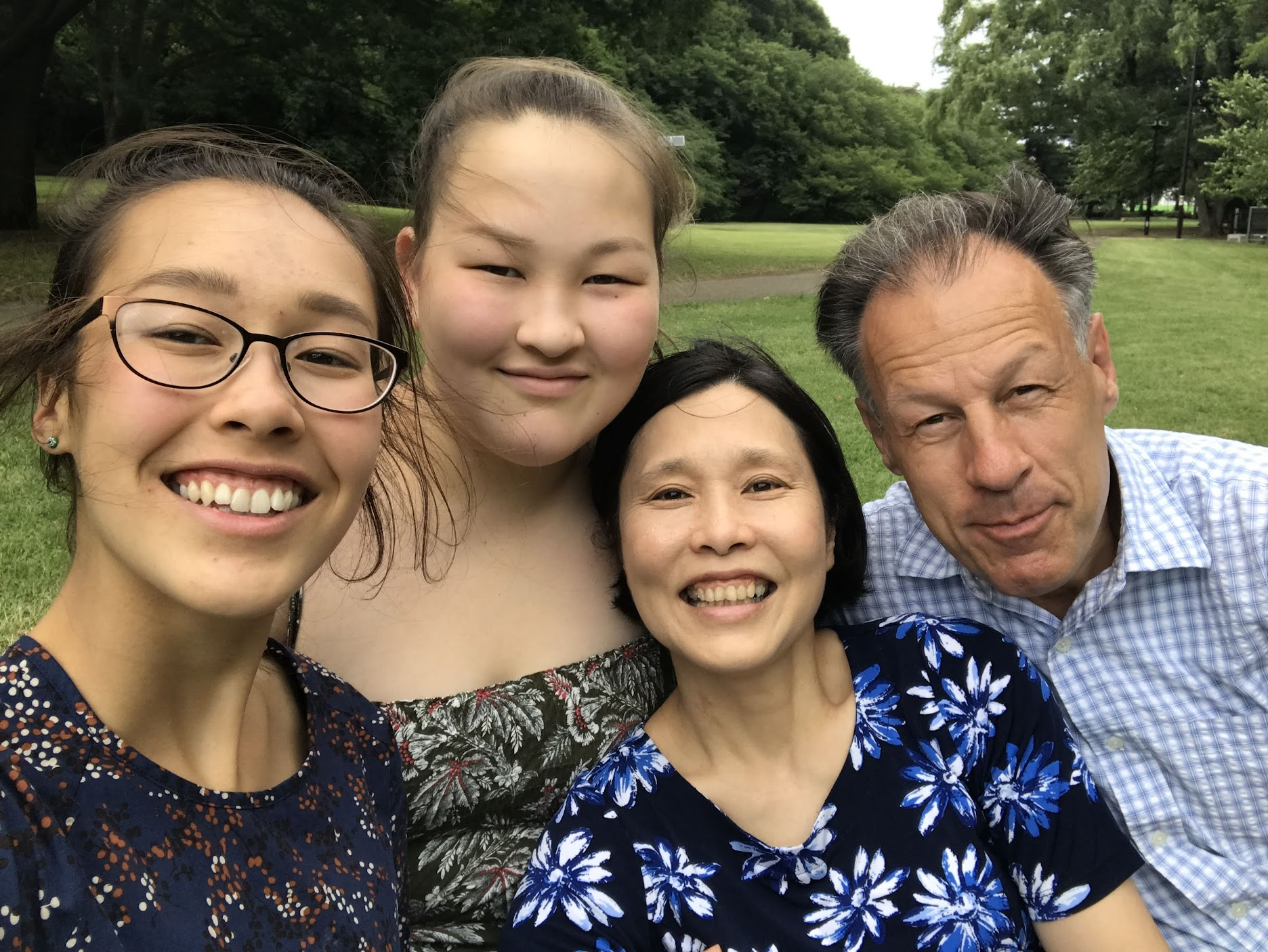Contributed by Lynne Mathies, craniopharyngioma survivor and RAWF intern
“At the end of the day, I’d be happy if I could help just one parent realize that this journey is far from hopeless and that we’re all in this together.”
When a child is diagnosed with and treated for a craniopharyngioma, parents are often left wondering how to best manage the resulting condition(s). I am a craniopharyngioma survivor, diagnosed at 5 and currently 19 years old. I had my tumor removed by surgery and was left with panhypopituitarism, hypothalamic obesity (HO), and vision deficits. Since I was lucky enough not to have other hypothalamic impairments, HO has been the main challenge I’ve faced in managing my condition. Through short anecdotes of my personal journey, I hope to share my opinion on HO management.
My HO Journey
I didn’t immediately gain weight after my surgery, probably due to my calorie-restricted diet and perhaps milder hunger, but my weight shot up after around a year. Even though my parents controlled my food intake and strongly encouraged me to exercise, I found ways to eat more, whether it be by sneaking food from the kitchen, stealing food from stores, or taking money from my parents to buy food. Being so young exacerbated the situation because I didn’t care about the health consequences I could face in the future; when I was hungry, I wanted to eat. My obsession with food and resulting obesity also distanced me from my friends and classmates, and I wasn’t as easily able to do activities other kids my age would do. Sometimes I even feel like I missed out on a proper, ‘normal’ childhood because of this.
As I grew older and progressed through my years of school, I became more conscious of my weight and was a bit more careful about what I ate. In my senior year of high school, I was even able to lose 20kg (44lbs) through my own efforts. I then went to study abroad for university, where I am now. Although I struggle every day to make the best decisions for my body, I know I’ve come a long way from where I was.
Am I the perfect role model for patients with HO? Not even close. I’m not at a healthy weight by any means, and yes, I do slip up sometimes. But what I have been able to achieve is some level of control over what and how much I eat; my condition no longer takes over my thoughts to make me do irrational things. So given my situation, here are some of my thoughts looking back on my HO journey so far.
Finding a balance between weight control and emotional wellbeing
Reflection 1: Negotiation
I always made sure to keep a stash of food for when I got hungry and had the chance to eat. But some days were better than others. Sometimes my stash contained plenty of food, assuring me I wouldn’t be hungry all day. Other times I had very little, whether it be because I couldn’t obtain anything or because my stash had been found and taken away. On one particular day, all I had other than my packed lunch was a single package of gummy bears—plenty for a ‘normal’ kid, but the bare minimum for me. I knew it would be difficult to get through the day with so little, but I figured I would manage somehow. As I was about to leave for school, however, my Mom found the gummy bears in my backpack and attempted to take them away. I tried to snatch it back, and it became a game of tug of wars: both of us were holding on to the bag, trying to pry it out of the other’s hands. But I lost. Knowing very well it was my last bit of food, I couldn’t imagine how I could survive with nothing. Was it even possible? I didn’t think so. So, I did what most kids are good at. I threw a tantrum and refused to go to school without them.
If you ask me whether I think parents should restrict their child’s food intake, I wouldn’t hesitate to say yes. HO drives many patients to want more food than their bodies need, and especially when talking about young children, they may not be able to make educated decisions on what or how much to eat. However, there’s a difference in how it’s done. Fighting over every morsel of food I ate was clearly not an ideal approach: it took a significant emotional toll on me, not to mention on my parents as well. Clearly, the interests of my parents differed from mine: they wanted me to eat healthily and in small portions to keep my weight under control, while I wanted food to subside my constant hunger. Although in retrospect I’m glad that there was some level of restriction, perhaps we should have reached a negotiation. Taking away the last bit of food that I was counting on to make it through the day was just not acceptable to me. Perhaps what would have worked better is if my Mom offered me a container of fruit or veggies to trade for the gummy bears. After all, all I wanted was to not be hungry, and I did like fruits and veggies. I understand that it would be ideal if I only ate lunch and nothing else. But the reality is that, if I am going to eat sugary snacks on the side because the food I was provided isn’t enough, wouldn’t it be better to provide more food? At least that way, my Mom would know it’s healthy and be aware of how much I was eating. What I want to say here is that maybe it’s better to be reasonable and allow for extra food if they want it. It may help reduce the number of unhealthy foods they consume, and eating healthy whole foods may, in turn, reduce their hunger.
Reflection 2: Parent-child relationships
On my way home from swimming practice one evening, I was hungry and wanted something to eat. I had a single coin (worth around a dollar) with me, but instead of buying something with it, I decided to try and steal granola bars from a store. I wasn’t successful in doing so, and my parents eventually found out. Later that evening, my Mom asked me why I didn’t buy something with the money I had rather than try to steal. It hadn’t occurred to her that I preferred stealing over having her find out I was eating food on the side.
Anyone in their right mind would probably be appalled by this. Even to this day, I think about why I chose to commit a crime over facing my Mom. The thing that non-HO individuals may not understand is that HO makes us do things we wouldn’t normally do. Many people say that being hungry makes them irritable or puts them in a bad mood. Imagine that hunger but more intense. What do you think you’d do? And what if that hunger went on minute after minute, hour after hour, day after day? I’m sure you’d agree with me that you’d do almost anything to get some food. If you have access to food, you’d eat it. But if you can’t get food at home and you can’t or don’t have money to buy any? That’s where things become an issue. Of course, I wasn’t starving. I was provided proper meals three times a day, and healthy snacks here and there, but that wasn’t enough for me. When I asked for more food, I often didn’t get enough to settle my hunger, and when I was found to be eating extra food, I was scolded. This made me try even harder to hide food from my parents rather than discouraging me from eating it in the first place. If, on the other hand, I was provided the environment in which I felt comfortable eating extra food, I may have bought something with the money I had or asked for more food when I got home. The point? Maintaining a good relationship with your child and fostering an environment in which they don’t feel the need to hide food from you can go a long way in managing HO.
Reflection 3: Trust
There was one point in time when my Mom decided to let me control my own food. She was tired of being the food police, and I convinced her that I could manage it myself. My intention was never to go on a diet, be strict with myself, or anything of the sort. I was equally tired and emotionally taxed being constantly denied food and scolded that I just wanted some space to eat in peace, at least to some extent. So, what happened, you ask? I gained weight, even faster than before.
So a quick note on trust: maybe think twice before putting too much trust into your HO child. I don’t just mean when you consider letting them control their own diet; I’m talking about any time you give them a bit of freedom, like when you leave them home alone or let them travel to school by themselves. I don’t know if this holds true for other HO patients, but I know that any tantrums I threw saying ‘why don’t you trust me?,’ insisting I can do it on my own, or promising to never do such a thing again were purely a show I put on to get my parents off my back. After all, having this condition made me so skilled at getting food any way I could, including through lying. Perhaps your child is truly trustworthy and has the best intentions, but this was not the case for me, and I have a feeling others would agree. Trust your instincts and give them freedom when you feel they’re ready, not when they say they are.
Reflection 4: Extreme interventions
Over the years, I gained a lot of weight, and there was no sign of it stopping. When I reached 90kg (198lbs) sometime in middle school, my endocrinologist strongly recommended I be admitted to the hospital for a month, where I would be put on a weight loss program. My parents were very hesitant, as they wanted the best for my health but also wanted me to have some freedom and enjoy my summer break. However, after being advised to consider this program throughout the previous year and with no sign of the weight gain subsiding, we agreed to try it out as a last resort. At the hospital, I was provided three meals a day in a total of 1000 calories and had to exercise three times a day for at least 30 minutes per session. Being locked up in my hospital room with no internet left me little to do other than read books and construct puzzles. It was hard to take my mind away from the constant rumbling in my stomach, and every hour, I thought about what food I would eat when I got out of the hospital. By the end of the month, I had lost some weight; in fact, I lost 10kg (22lbs). Once I was free, though, things turned the other way. I ate all the foods I dreamt about and ended up gaining all the weight back, plus more.
If you ask me, extreme interventions like this only work as long as their duration. Since I was controlled by my environment, it shouldn’t be surprising that I lost weight while I was at the hospital but gained after I was discharged. Losing weight and becoming healthy requires lifestyle changes, not short bursts of dieting. Unless I was kept in such a controlled environment for a long, long time, my weight loss was bound to be temporary, just like with yo-yo dieting. But if weight loss comes with intentional lifestyle changes and the formation of healthy habits, the excess weight is more likely to stay off. This doesn’t mean I advise against putting your HO child in a weight loss program. It is just to say, think about what the program will do: is it simple environmental control, or does it provide some freedom, fun activities, and encourage, rather than force, healthy eating? I think building healthy habits over the years to achieve slow but steady weight loss is more beneficial than going for extreme interventions once in a while. After all, these days it’s almost impossible to avoid the temptation of unhealthy foods. If a patient with HO wants independence, having a strong foundation of healthy habits is crucial.
Reflection 5: Siblings
My sister and I went to the same school, and she would occasionally find me eating something I shouldn’t have been. At one point during high school, I was obsessed with a specific chocolate bar and had a stash of them in my locker. When I went to grab one, though, they were missing. Although we weren’t allowed to keep food in our lockers, I knew it wasn’t a teacher that took them. After all, I would have been notified if teachers were checking lockers, and this was in high school, where they weren’t monitoring my food. I figured my sister must have taken them, so I went to her locker and found the chocolate bars stacked up in a pyramid. Maybe she wanted the chocolate herself? Or perhaps she had good intentions to help me? Either way, I was hungry, so I claimed them back and eventually ate them.
Hypothalamic obesity affects the people around the patient, too. I don’t just mean it in the sense that everyone has to be on their toes and make sure the HO child doesn’t eat too much. I mean that constant arguing about food may negatively affect the eating behavior of others, especially of other kids in the family. Imagine watching your little sister being told she can’t eat certain foods, shouldn’t eat in between meals, or can’t have seconds at dinner. Or generally having to listen to your Mom and sister argue about what she can eat and how much of it. It shouldn’t be surprising that siblings can be negatively affected by this and become picky eaters, develop aversions to certain foods, or generally lose interest in eating. Not only this, I don’t think my sister fully understood my condition; as far as she knew, I was out of the hospital and a normal kid again. Watching me struggle with my weight and having my diet controlled so strictly made her think she had to be careful, too. I can’t say for sure, but I think this could be why my sister now struggles to maintain a healthy relationship with food. Even though it’s difficult to prevent siblings of HO patients from being affected by meal-time arguing, perhaps explaining to them what HO is may help them separate their sibling’s situation from theirs.
It wasn’t all bad, though! Having HO, my parents were understandably very concerned about my diet: they gave me small portions, provided healthy food, and tried to prevent me from getting food elsewhere. However, I wasn’t in this alone. The rest of my family mostly ate the same food, which meant I didn’t have to deal with being tempted by what everyone else was eating. Although my sister was expected to cooperate and not eat too many tempting foods around me, she was allowed bigger portions for meals, occasionally got treats on the side, and wasn’t restricted when she ate with her friends. I think there really needs to be a balance between supporting the HO child and allowing your other children a bit of freedom.
Reflection 6: Food opportunities
When given the opportunity, I would eat. Growing up in an international community, there were plenty of opportunities: at school, there were parties for all occasions, including Halloween, Christmas, Easter, end-of-year, and birthdays. Even outside of school, any gathering or social event included food, and lots of it. For me, such events would be less about celebrating the occasion and socializing than an opportunity to eat and stash food for later.
Don’t get me wrong, I’m genuinely grateful to my parents for enrolling me in ‘regular’ school rather than a ‘special ed’ school, considering my tumor didn’t significantly impact my cognitive functioning. What I do wish, though, is that schools and social events wouldn’t promote unhealthy eating. Well, at least that’s my opinion now. If you asked me several years ago, I would have told you I loved the school food culture and social events; after all, it was an easy way for me to get food and avoid being hungry. But looking back, perhaps avoiding such occasions and the temptation to eat or stash food would have been a smarter move. This is not to say I recommend completely distancing your child from all fun events. Perhaps choose which ones to attend, and agree on a plan of what they’ll eat beforehand. School may be a bit more difficult to manage, but if you’re school-hunting for your HO child, it may be worth investigating their food culture as well.
One last little piece of advice…
I guess this is only relevant for older HO patients, but please, please don’t say “I understand” or “I get it” when you talk about our struggles with HO. Making us feel like what we are experiencing with hunger and weight gain is normal doesn’t help, it just invalidates our suffering. Of course, other patients may disagree with me, but this was and still is one of my biggest pet peeves.
Conclusion
Although it may not sound this way, when I look back on my experiences managing HO, I think my family and I handled it the best we could. Even though I wrote a lot about how I wish my parents handled things differently, I don’t blame them for anything; I know they did what they did with their best intentions in mind. But if I were to summarize the overall positives and negatives, it would look a bit like this:
“I don’t win every day, but I know I’m better than I was before. This can be your child, too. Don’t give up and keep at it! You got this.”
What I liked about my parents’ approach:
-
Despite what it felt like, I know I got all the love and compassion I could have ever asked for
-
There was some control over my diet and exercise
-
We ate mostly the same foods
-
My sister was allowed some freedom in what she ate
What didn’t work so well:
-
My diet was controlled too strictly
-
I was trusted when I wasn’t ready
-
I was put in a weight loss program that only provided environmental control
-
It wasn’t explained to my sister that my weight gain was not normal
-
I often attended social events that tempted me to eat unhealthy foods
Although these (and everything I’ve mentioned so far) are solely my experiences and opinions, I hope one of my stories resonates with you or helps you gain insight into the patient perspective on HO management. Every patient with HO has a different story, so by no means are my suggestions or advice relevant to everyone. At the end of the day, I’d be happy if I could help just one parent realize that this journey is far from hopeless and that we’re all in this together.
I am fully convinced that the day will come for most HO patients when they will be able to manage their own food. I don’t know what it was for me—perhaps age, maturity, and knowledge about nutrition? In any case, I know it has helped me go from having no self-control around food, being limited only by my environment, to making conscious decisions based on internal negotiations between my desire to eat and my desire to be healthy. I don’t win every day, but I know I’m better than I was before. This can be your child, too. Don’t give up and keep at it! You got this.








